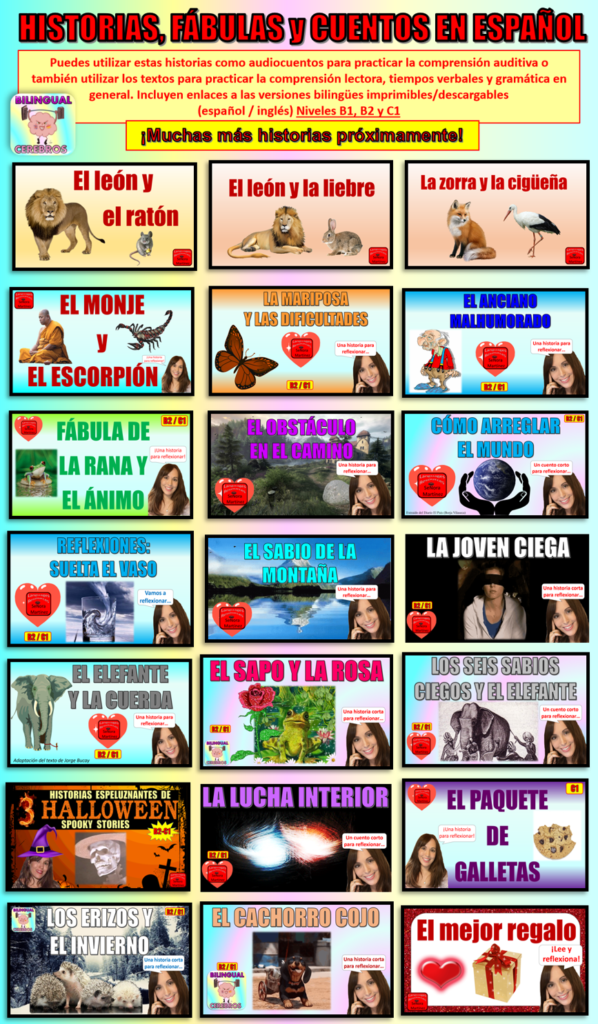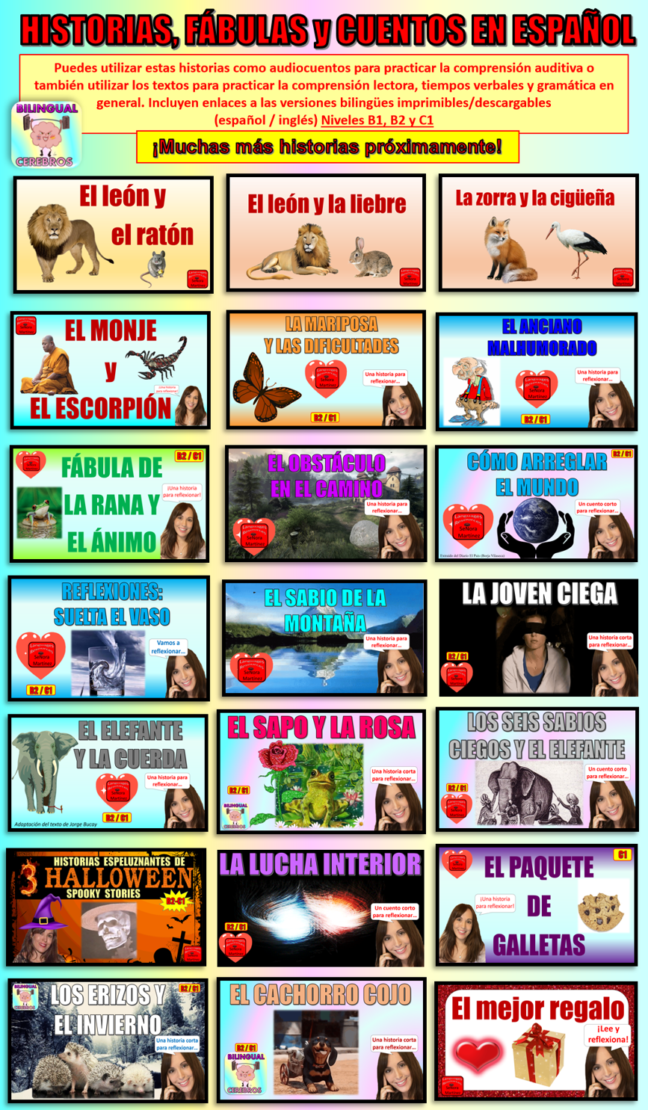by María Martinez
Having passion for reading is something that should be instilled in our students at a very early age. Today it is not so easy. Previous generations had fewer ‘distractions.’ There were not as many channels with such a variety of programs; there was no Internet or social media and video games were more limited. Sadly, that passion for reading that previous generations had, is being lost today due to competing with all these other media.
It is our job, as parents, teachers and educators, to do something about it. Reading must be a vital part of students’ daily lives and we must find ways to promote it, motivate our students and make reading exciting again for the new generations.
In my lessons, both with my students who study Spanish as a foreign language, and with those students who are heritage Spanish speakers, reading stories is very important. Reading opens a door to imagination and creativity. In addition, it helps students reinforce grammar and spelling patterns without needing to use boring and repetitive grammar exercises. Furthermore, reading expands their vocabulary by finding synonyms and gaining vocabulary richness without even realizing it as it models language in a subtle way.
In my channel BILINGUAL CEREBROS, you can find a section in the Playlists where there are already 27 short stories and fables with morals to reflect on. Many activities can be done with them. These are some ideas on how to use the short stories, tales and fables on my channel:
1. Summarize the story using your own words.
2. In small groups, role-play the story.
3. Explain the moral of the story. Give your point of view about what is learned from this story. What value/values does it teach us?
4. Practice your verbal fluency and pronunciation by reading the story aloud.
5. Who is the main character in this story? / Who are the characters in this story?
6. Describe the characters in this story. What is their personality like?
7. Find the verbs in the past tense (Pretétito indefinido & Pretérito imperfecto) and analyze their uses.
8. Compare the English version with the Spanish version. What new words or expressions have you learned with this story/fable?

In addition, students can review these stories at home and listen to the pronunciation again since they are all published on the channel and they can access them for free.
If you need the bilingual version of these stories for your lessons, I can also send them to you for free in PDF or PowerPoint versions. You can email me at: bilingualcerebros@gmail.com to request your copy. Students can use these bilingual versions to compare vocabulary and structures in Spanish and English.
Here are the direct links to the 27 stories that are on the channel so far, and I will continue uploading new stories. I hope they are useful.
- El león y la liebre: https://www.youtube.com/watch?v=DBm6ZPEi9dI&t=4s
- La zorra y la cigüeña: https://www.youtube.com/watch?v=Shi497XqhuU&t=12s
- El león y el ratón: https://www.youtube.com/watch?v=Ycr5WGcye2I&t=17s
- Tres historias espeluznantes de Halloween: https://www.youtube.com/watch?v=skfmvKkUjUk
- El monje y el escorpión: https://www.youtube.com/watch?v=fubufPhvn0s&t=8s
- Fábula de la rana y el ánimo: https://www.youtube.com/watch?v=KDW7Jkv2wwQ
- El paquete de galletas: https://www.youtube.com/watch?v=RNRt2qYEN4E&list=PL5TlFjB4h2gXEG7xuagyRjMJV97TMKqRe&index=12
- El elefante y la cuerda: https://www.youtube.com/watch?v=GUhTd8XYY2U&list=PL5TlFjB4h2gXEG7xuagyRjMJV97TMKqRe&index=13
- El mejor regalo: https://www.youtube.com/watch?v=1THweV4udkg&list=PL5TlFjB4h2gW6D5mUIR8voZ3PgvhSjhBt&index=9
- La mariposa y las dificultades: https://www.youtube.com/watch?v=H2I_02gNh8U&t=27s
- Suelta el vaso – Reflexión: https://www.youtube.com/watch?v=nfieH-RU4N8&t=65s
- El anciano malhumorado: https://www.youtube.com/watch?v=UZvB7gQ_lPc&t=20s
- El obstáculo en el camino: https://www.youtube.com/watch?v=B0DHeFPfQq0&t=72s
- El sabio de la montaña: https://www.youtube.com/watch?v=KrEqLLYqtO4
- B1/B2 – EL CARACOL CARLOS – Una historia para practicar los distintos sonidos de la letra c: https://www.youtube.com/watch?v=QE5wRBcAbss
- B1/B2 – EL GUSANO GONZALO – Una historia para practicar la g suave y la g fuerte: https://www.youtube.com/watch?v=k3GlOKVgcZc&t=11s
- B2/C1 – CÓMO ARREGLAR EL MUNDO: https://www.youtube.com/watch?v=ZY-XE6bGhp0&t=33s
- B2/C1 – LA LUCHA INTERIOR: https://www.youtube.com/watch?v=nDfcyTV1KRY&t=14s
- B2/C1 – LOS SEIS SABIOS CIEGOS Y EL ELEFANTE: https://www.youtube.com/watch?v=Gcl7LBso80w&t=18s
- B2/C1 – LA JOVEN CIEGA: https://www.youtube.com/watch?v=mLbJelavV7U&t=2s
- B2/C1 – LA ROSA Y EL SAPO: https://www.youtube.com/watch?v=eGDGUvge1aI&t=9s
- B2/C1 – LOS ERIZOS Y EL INVIERNO: https://www.youtube.com/watch?v=45Xruk1yETo
- B2/C1 – EL CACHORRO COJO: https://www.youtube.com/watch?v=L6nGUbWwrxw
- B1/B2 – DISCUTIR CON UN BURRO: https://www.youtube.com/watch?v=Y7x8JZXDjfY&t=5s
- B1/B2 – EL CABALLO Y EL ASNO: https://www.youtube.com/watch?v=4gE6cHM0mek
- B1/B2 – EL VERDADERO VALOR DE LA NAVIDAD: https://www.youtube.com/watch?v=RHFovoDwL58&list=PL5TlFjB4h2gW6D5mUIR8voZ3PgvhSjhBt&index=25
- B1/B2 – LA PARÁBOLA DEL COLIBRÍ: https://www.youtube.com/watch?v=9PL_oIqur8k
Enjoy!

I would also like to invite your students to participate in the Poetry Competition organized by my channel. Here are the details about it:

Do not hesitate to contact me!
♡ YouTube: https://www.youtube.com/@bilingualcerebros
♡ instagram: https://www.instagram.com/languages_sra_martinez/
♡ tiktok: https://www.tiktok.com/@bilingualcerebros
♡ facebook: https://www.facebook.com/LanguagesResourcesSraMartinez
♡ twitter: https://twitter.com/LanguagesSra
♡ linkedin: https://www.linkedin.com/in/maria-martinez-5bb94a1a5/
Other Related Posts:
